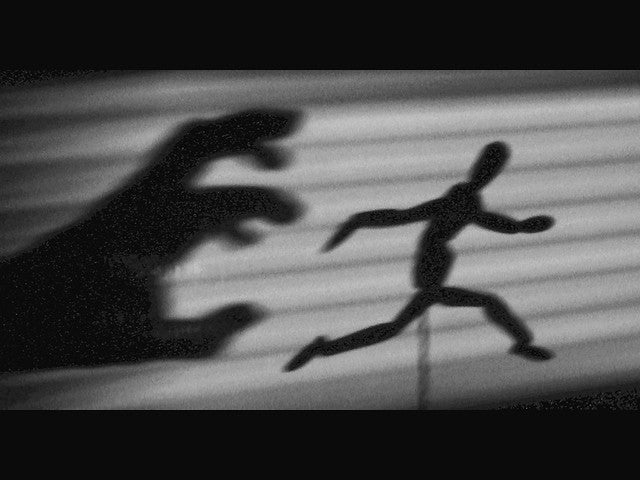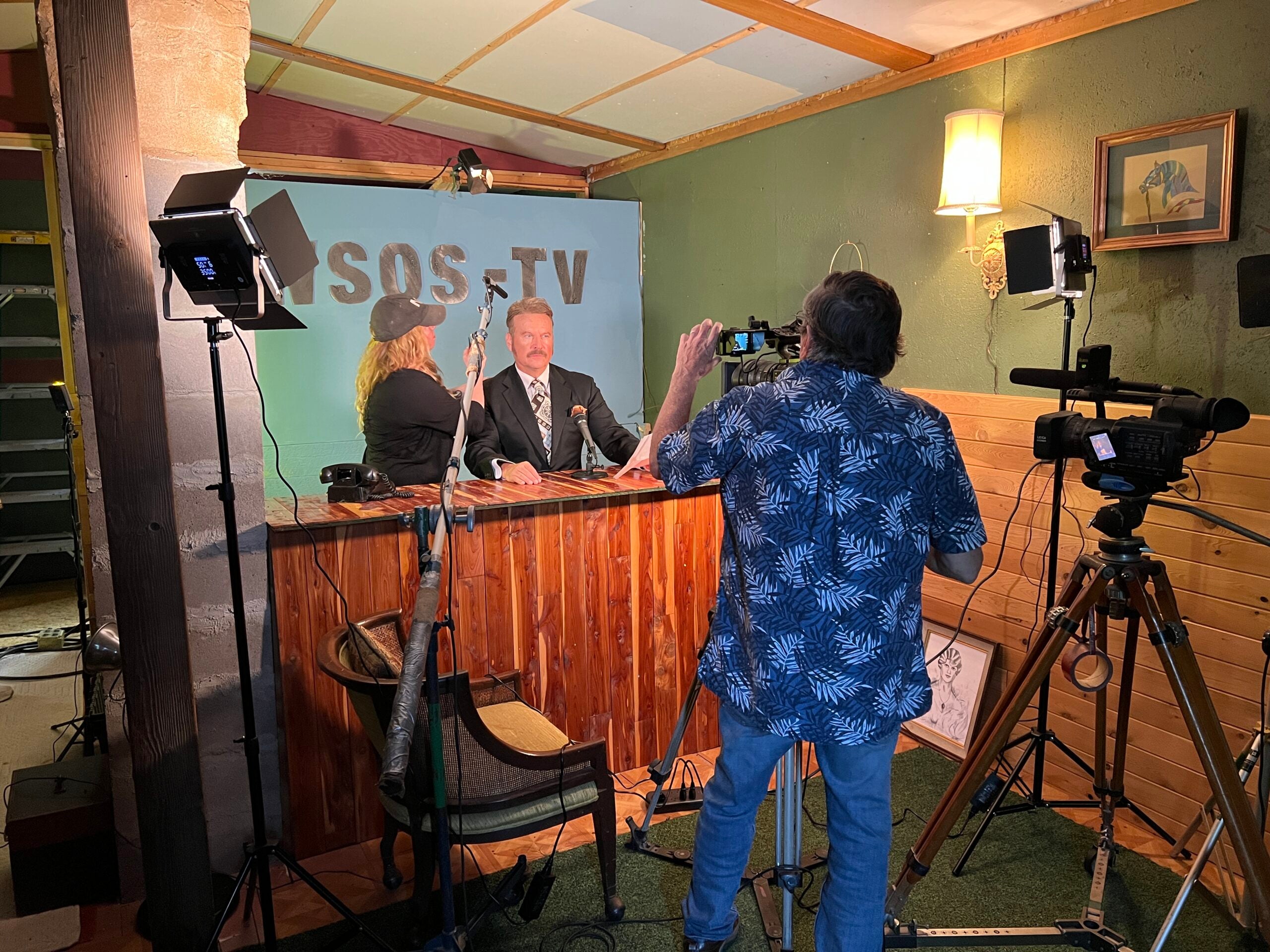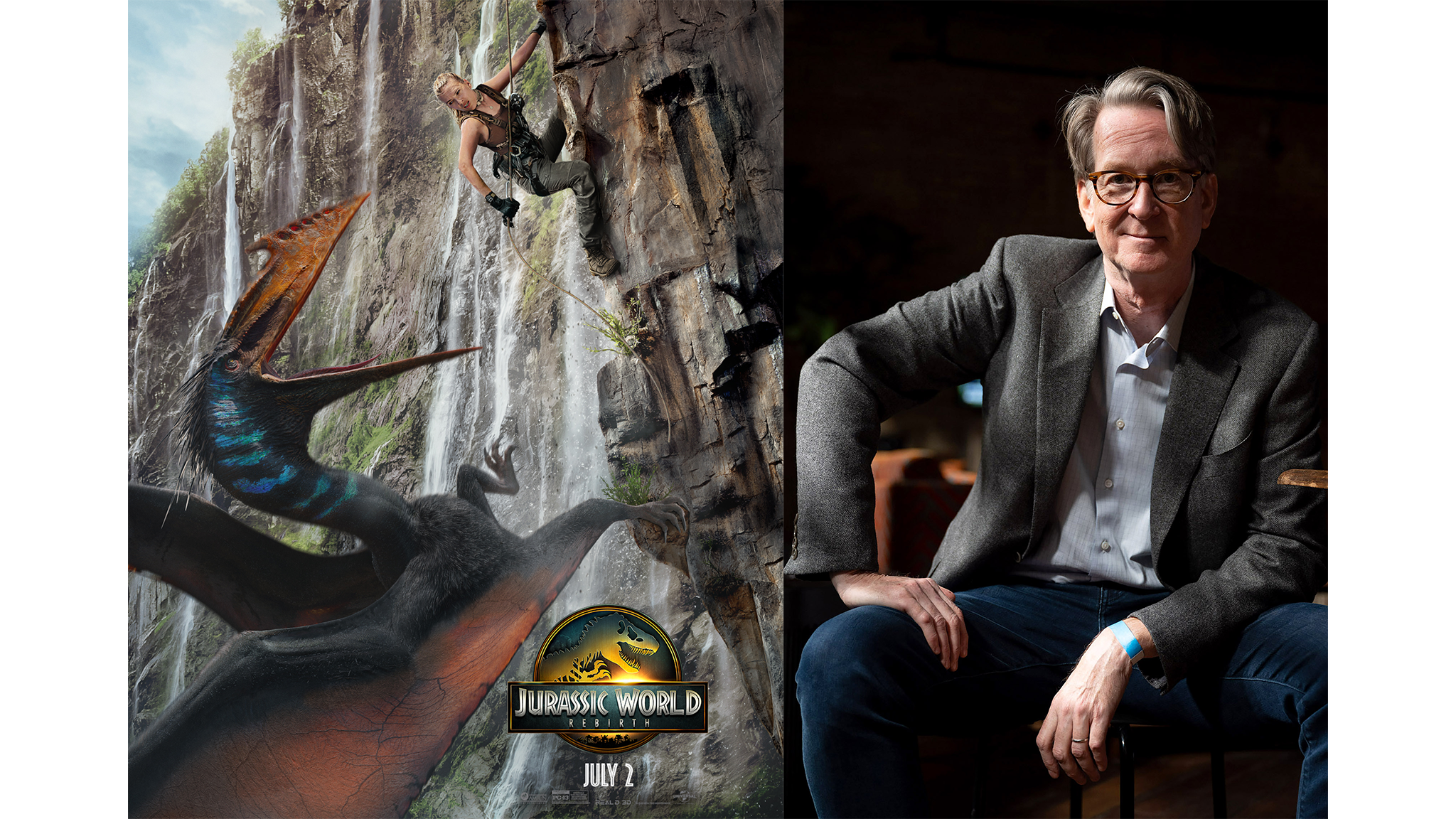Comedian Ginny Hogan wades through office gender politics with her new satire, “Toxic Femininity in the Workplace.” Plus, filmmaker Don Coscarelli looks back on his cult classic, “Phantasm” and author Tope Folarin grapples with identity in his debut novel.
Featured in this Show
-
Comedian Ginny Hogan Turns The Conference Room Tables In 'Toxic Femininity'
To kill her boredom while working as a data scientist at a financial tech startup in San Francisco, Ginny Hogan decided to take a stand-up comedy class.
“I really just thought it was going to entertain me for a few months or so while I was bored at work, but I got very hooked on it,” the comedian and satire writer told WPR’s “BETA.”
There’s an old adage in comedy that you shouldn’t quit your day job, but that’s exactly what Hogan ended up doing. After getting hooked on stand-up, Hogan explored other outlets for her comedy including her lifelong passion for writing.
“I think I was pretty into the art of speaking as a teenager. I was very into my high school speech team and I liked the idea of trying to write something that was as condensed as possible which I feel is a lot of humor writing,” she said.
Hogan began writing freelance satirical pieces and shopping them out to publications. It turns out her instinct to leave her tech job was a good one. McSweeney’s published her first submission. She may not have been aware of how big of a deal that was at the time, but Hogan quips that her numerous rejections from McSweeney’s since have put that milestone into perspective.
“If not for that piece (being published) I probably wouldn’t have decided that satire was a good route to go down,” she says.
In 2018, Hogan published the “Examples Of Toxic Femininity In The Workplace” in The New Yorker Daily Shouts. The piece would go viral and end up on the zine’s prestigious year-end best of list.
“It was at the beginning of the ‘Me Too’ movement and everyone was talking about toxic masculinity, so I made a reference to toxic femininity in conversation with a friend and then I thought maybe I could try to heighten it and turn it into a satire piece,” Hogan said.
The piece imagined office scenarios freed from toxic masculinity that still somehow end up hilariously in disaster. Hogan culled a lot of the material from her own experiences at the male-dominated tech companies she was familiar with.
Hogan’s favorite joke from the piece is actually from a real life experience.
She writes:
“Jessica begins speaking, and no one speaks over her. She didn’t actually have an ending to her presentation prepared, because she expected to be interrupted. She is mortified.”
“I was on this team,” Hogan said, “where it was basically like 20 men and me and I was so used to no one even listening if I were to try and talk in meetings that I just basically stopped paying attention and there was one time where the CTO turned and asked me directly what I thought. It was after two years with this company and I had been paying no attention at all.”
Hogan has now expanded this concept with her recently released humor book, “Toxic Femininity in the Workplace.”
“I had many ideas for separate pieces that could be in a book like this,” she said. “So we decided on doing a humor book of short satirical pieces for women in the workplace.”
Hogan sprinkles in humorous quizzes (“Do You Look Alike, Or Are You The Only Two Women Who Work Here?”) and illustrations among her many workplace essays including: her riff on the popular children’s “If You Give” book series, “If You Give A Man A Compliment On His Mediocre Job Performance.”
“I think it’s really very fun to satirize children’s books because they’re a pretty common reference. It feels like a lot of people will know the same one more so than books for adults,” Hogan said.
While “Toxic Femininity” is a work of satire, Hogan is shedding some light on some dark truths about the obstacles women face. She said that while the book does lean on her experiences in tech and start-up atmospheres, she feels it can be universally relatable to women.
“I think it will appeal to women in the workplace generally because basically anything that is workplace specific to tech, I think is also something women in all fields would definitely relate to,” she said.
Hogan is also a force on Twitter where she can workshop jokes or sharpen satire ideas. She also said that it helped her forge the confidence to discuss any topic, no matter how personal.
“For me, a big part of comedy is that I’m no longer embarrassed to talk about things I used to be embarrassed to talk about,” she said. “I don’t have any desire to hide my political views or hide my mental health issues. There aren’t that many subjects I think of as being off limits.”
I pay my shrink over $100/session, so you better believe I tried to sell him my book
— Ginny Hogan (@ginnyhogan_) August 20, 2019 -
Filmmaker Don Coscarelli On His Indie Horror Hit, 'Phantasm'
Don Coscarelli is the youngest filmmaker ever to have a feature film distributed by a major studio. He was only 19 years old when he sold his independently-produced and critically-acclaimed drama, “Jim, the World’s Greatest,” to Universal Pictures.
But it was Coscarelli’s third film that put him on the map — an indie horror movie called “Phantasm.” He wrote it, photographed it, directed it and edited it.
“Phantasm” was released in 1979 and has since spawned four sequels. The film is now considered a cult classic and has appeared on many critics’ lists of best horror films. Coscarelli writes in great detail about making “Phantasm” and other films like “The Beastmaster” and “Bubba Ho-Tep” in his memoir, “True Indie: Life and Death in Filmmaking.”
“Somebody once told me that horror films make money,” Coscarelli told WPR’s “BETA.” “It’s funny because today that’s absolutely the truth because some of the most successful films are the horror and genre films. But at any rate, I got this bug in my mind that maybe my next film, I needed to do something a little bit more commercial. And so I decided to try doing horror.”
“Phantasm” is about a 12-year-old boy named Mike (played by Michael Baldwin), who lives with his older brother, Jody (played by Bill Thornbury). The two brothers are recent orphans. Mike is trying to come to grips with the loss of his parents and the potential loss of Jody who wants to leave.
“(Mike) has an active imagination but he just might be the sharpest knife in the drawer in that town,” Coscarelli said. “And he starts to notice some strange things going on. There’s a series of murders, one of their friends is killed. There’s a funeral up at this odd mortuary cemetery complex called Morningside. And our hero, Mike, witnesses some strange things and notices this strange, very enigmatic and sinister mortician (played by Angus Scrimm). And he and his brother and their neighborhood friend Reggie who’s the ice cream vendor (played by Reggie Bannister) get involved in trying to learn what is going on up here and pretty soon, it takes some really strange, frightening turns.”
Coscarelli explained that the inspiration for the story came from the way our society deals with death.
“There’s this strange practice of men dressed in dark suits and they’re in these mausoleums. And you give them the dead body of your deceased relative and it goes away into sort of a, I don’t know, experimentation or scientific operating lab. And then the corpse comes back looking kind of like your relative but not exactly … And I thought this would be a great setting for a horror film.”
Coscarelli was also inspired by a 1953 indie science-fiction movie called “Invaders from Mars.” The story revolves around a boy who witnesses a flying saucer disappear into the large sand pit behind his house. Nobody believes the boy when he tells them what he saw. Coscarelli was intrigued by the idea of having a kid who saw strange things but was left on his own to try to figure out what was going on.
“And not really knowing it, but I ended up making a mashup of horror, fantasy and science fiction,” Coscarelli said.
Coscarelli got the idea for the silver sphere that flies down the corridors of the Morningside funeral home from a dream he had when he was 15 years old.
“It’s maybe one of the only dreams I’ve remembered vividly enough to put into a film,” he recalled. While writing the film, Coscarelli decided the orb in his dream would make an interesting storytelling device.
“That image of the sphere and the way that this sphere, you know without giving away too much, it becomes a deadly killing device … the impact of that sequence really woke audiences up,” he said. “And a lot of people never forgot it. I will be introduced to people and they go ‘Oh, you did ‘Phantasm,’ … I don’t know if I know that movie.’ And then all I have to do is just put my hand with a couple of fingers out and go ‘You know, the one with the ball like that.’ And they immediately remember.”
The fact that the silver sphere was inspired by a dream is very appropriate because “Phantasm” plays out like one of the weirdest nightmares you’ve ever had. It’s surreal and dream-like. One could say it’s very similar to David Lynch’s first feature film, “Eraserhead,” in that way.
Coscarelli said when he made the film, he was willing to take risks in telling a “story in a different kind of style.”
“I was a little younger, a little more confident possibly like the young are … and as I was making the movie, I started to not worry so much about whether the audience was comprehending what I was doing exactly. And that’s a risky thing to do,” he said. “Thank God, it worked out. But I do think that by having it grounded with some real elemental scares throughout, it kept audiences’ attention.”
Forty years after its original release, “Phantasm” continues to have a devoted following. Coscarelli thinks there are a few reasons why the movie has struck a chord with so many people. One is the passion of horror fans and another is that the basic theme of what happens when you die is a universal question we all think about. Another is the strong family bond between the orphaned brothers.
Coscarelli says there’s one other element to “Phantasm’s” staying power that he’s discovered in recent years while meeting men in their 30s, 40s and 50s.
“They always tell me ‘You know, when I saw that movie, I just never forgot it because there was that kid and he was shooting a shotgun, he was driving his brother’s car, he was fighting the undead.’ In a weird way, and not by any design, I created this teen male empowerment movie.’”
-
The 'BETA' Team Shares Their First Horror Film Scares
After an interview with filmmaker Don Coscarelli about his groundbreaking horror film “Phantasm,” the “BETA” team sat down to discuss the first horror film that scared them to death. Here’s what they had to say:
J. Carlisle Larsen, ‘BETA’ Guest Host
“‘Close Encounters of a Third Kind’ really, really freaked me out. A little background: at the time I was watching it, I was probably around 6 or 7 getting a perm in my living room and I was trapped there, because my mom was doing the perm, watching the movie. Couldn’t escape. Had to watch all of it and it really freaked me out. So, it could’ve been the fumes or it could’ve been the movie, but it was definitely terrifying. Cannot watch it to this day,” Larsen said.
“I also lived in Nevada, which in the 90s, was the height of UFO stuff, so I was also very spooked,” she added.
Steve Gotcher, ‘BETA’ Technical Director:
“When I was a kid, around 10 years old, I lived in Los Angeles and there was this Saturday afternoon show that featured old horror movies and science fiction movies called ‘Strange Tales of Science Fiction.’ One afternoon they showed ‘Invasions of the Body Snatchers.’ It was the kind of film that made you feel very uncomfortable, the way it was shot, the way the dialogue went. The final scene in the film … I couldn’t sleep that whole night. It was terrible,” Gotcher said.
Doug Gordon, ‘BETA’ Host:
“I think I have to go with it because of the impact it had when I saw it was Alfred Hitchcock’s 1960 classic ‘Psycho.’ Well, for one thing, it’s one of the most iconic scores — the Bernard Herman score. Just all strings in the famous shower scene sting. Just the audacity Hitchcock had to kill off Janet Leigh’s character, Marianne Crane, at the end of the first act about 47 minutes into the film,” Gordon said.
-
Author Tope Folarin's Debut Novel Reflects His Own Search For Identity
Tope Folarin is a Nigerian American writer. He won the Caine Prize for African Writing in 2013 and earned two master’s degrees as a Rhodes scholar.
Folarin’s debut novel is called “A Particular Kind of Black Man.” It’s about a Nigerian family living in Utah and the challenges they face adapting to American life.
The novel centers on Tunde Akinola and his family.
Tunde is born and raised in Utah while his parents are from Nigeria. Tunde’s father comes to America to attend college and earn his degree. When Tunde is 6 years old, his mother begins to experience some kind of mental illness. At one point, she takes Tunde and his brother, Tayo, away from their home to a shelter. Eventually, she becomes sicker and returns to Nigeria. This leaves Tunde and Tayo alone with their father.
Folarin told WPR’s “BETA” that his novel is about how Tunde experiences life and how he proceeds to construct his identity during his formative years.
During Tunde’s first day at school, one of his classmates rubs Tunde’s skin and then runs away crying to the playground attendant that the brown won’t come off. Folarin said that he experienced something similar when he was growing up in Utah but it didn’t happen quite the same way in real life.
“Somebody finally had the courage to come up and ask me why I was dirty all the time,” Folarin said. “And I was completely flummoxed because I thought well, you know, actually I like taking baths and I don’t think I’m dirty. And the kid kind of pointed to me and said you’re always dirty and why don’t you take a bath? I remember a teacher kind of swooping in and trying to salvage the situation but not doing a very good job.”
“And when I asked my father, he was completely beside himself. And I think part of it, too, was that he never thought he would have to deal with this,” Folarin continued. “He’s from Nigeria, he’s from a place where he looks like everyone else, and so I don’t think he ever prepared himself to have the kinds of conversations that he had to have with his kids all the time about who they were and how they were still important despite what others might be saying about them.”
Folarin said a lot of the novel, especially the beginning sections, are based on his own life experience.
“To be perfectly frank, when I started writing this, I wasn’t quite sure what I was writing. I thought maybe I’m writing about my life or maybe I’m writing fiction. And I just thought I’ll sit down and write and see what happens,” Folarin said “And the thing that happened is that the more I wrote, the more that Tunde’s life began to diverge in a very substantial way from mine. So the broad outlines of his life are similar to mine. He grew up in Utah, I did as well. He spent his high school years in Texas, I did as well. He went to Morehouse College, I did as well.
“But the way he responds to various situations, the way he responds is different than I responded to those situations. And the more I wrote, the more I felt a kind of life pulsing on the page that differed in substantial ways from my own.”
In a 2013 profile, Folarin said he’s been having the same conversation his whole life about where he fits in. Six years later, he’s published “A Particular Kind of Black Man.”
Throughout this self exploration, Folarin said he’s come closer to understanding where he fits.
“I know that one core important part of my identity is that I’m an artist. And that centers me in a way that nothing else has before,” Folarin said.
“I’m an artist and I create art and I interact with art. And that’s very important to me,” he continued. “I think the other thing, and the most important thing, is that I have a family, that I’m married and I have a 2-year-old. And having a family has really done wonders for me in terms of like sort of rooting me certainly in a family, in this kind of unit that I belong to. Those two things have been really important to me.”
Episode Credits
- Doug Gordon Host
- J. Carlisle Larsen Host
- Steve Gotcher Host
- Doug Gordon Producer
- Adam Friedrich Producer
- Steve Gotcher Technical Director
- Ginny Hogan Guest
- Don Coscarelli Guest
- Tope Folarin Guest
Wisconsin Public Radio, © Copyright 2025, Board of Regents of the University of Wisconsin System and Wisconsin Educational Communications Board.



